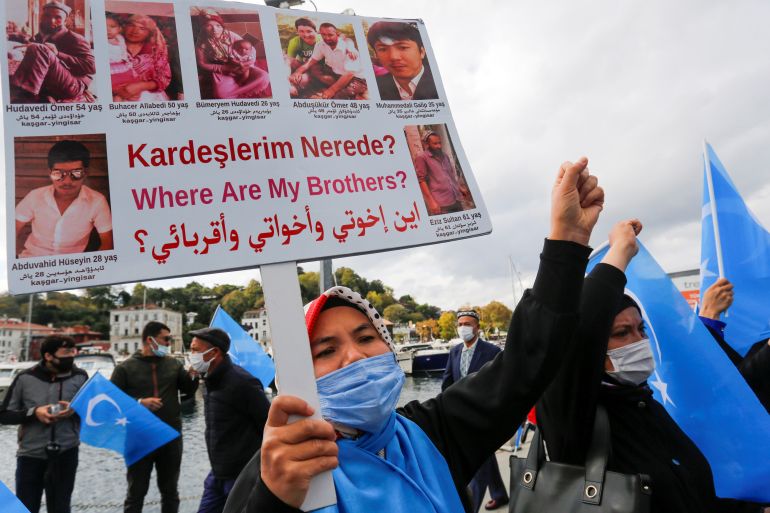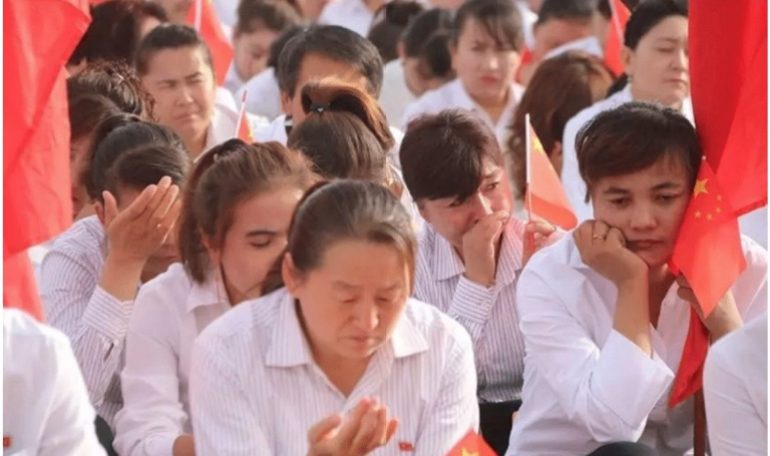Xinjiang’s ‘architecture of repression’ targets Muslim Uighurs
Australian think tank calls for an investigation in China’s Xinjiang following publication of leaked documents allegedly detailing Uighur repression.

In November of 2018, Anayit Abliz, a Muslim Uighur from China’s far western region of Xinjiang, was sentenced to three years in prison for using a file-sharing application called Zapya and a virtual private network (VPN) to communicate online the previous year.
During the months of detention leading to his conviction, the teenager’s family was subjected to intrusive surveillance, with their daily activities chronicled in a series of reports filed under the heading, ‘Situation regarding persons who are detained or going through re-education’.
Keep reading
list of 4 itemsUS set to add more Chinese companies to blacklist over Xinjiang
Open Xinjiang to ‘independent observers’, Canada tells China
YouTube shuts Xinjiang videos pushing rights group to seek backup
In one incident, a neighbourhood watcher entered Abliz’s family home and reported they had found his father, mother and sister all watching television. Another time, the government-assigned monitor noted that the family members were just “going about their business” inside their house.
It is thought that in Xinjiang, the discovery by authorities of the widespread use of the Zapya application “prompted millions of investigations at the grassroots level” similar to the intrusions faced by Abliz’s family, according to a new report published by the Australian Strategic Policy Institute (ASPI) based in Canberra.
Between July 2016 and June 2017, government monitors assigned by Beijing flagged at least 1,869,310 Uighurs and other citizens in Xinjiang for using Zapya, the report revealed. ASPI’s latest report is based on thousands of documents leaked to the think tank.
Since early 2017, vast numbers of Uighur men and women, as well as other Muslim ethnic minorities, have been arbitrarily detained or imprisoned according to the United Nations and human rights groups.
They include hundreds of thousands who have been sent to prisons, in addition to the one million the UN estimates to have been sent to internment camps.
The detentions and alleged abuses inside enclosed government facilities have been described by the United States and international human rights groups as a form of genocide constituting “crimes against humanity”. Last month, Amnesty International accused China of creating a “dystopian hellscape” in Xinjiang.
China has rejected the allegations, saying its policies towards the Uighurs and other Muslim minorities living in Xinjiang are necessary to “fight extremism” and promote upward economic mobility for the impoverished ethnic group.
But the latest report detailing how China’s “vast system of coercive state control works” only bolsters the allegations of the existence of an “architecture of repression” in Xinjiang targeting Uighurs and other Muslim minorities, according to ASPI.
Publicly-available data
The 82-page report also draws on previously unpublished material from thousands of Chinese-language sources, including police records and budget documents obtained by scraping through publicly available Chinese government websites.
Using the data, ASPI pieced together evidence showing “five key sets of Xinjiang’s repressive policies” from mass internment, forced labour and mass at-home surveillance to “coercive birth control and ubiquitous propaganda”.
🚨NEW PROJECT🚨
@ASPI_ICPC's new project 'The Architecture of Repression: Unpacking Xinjiang’s Governance' by @xu_xiuzhong, @jleibold & @DariImpio explores the whole-of-government & whole-of-society approach to governance in XinjiangExplore the policy brief here 🧵 ⬇️ pic.twitter.com/iQByRAtc1g
— ASPI (@ASPI_org) October 19, 2021
In Xinjiang’s capital city of Urumqi, for example, the Beijing-controlled government has deployed “neighbourhood committees” and the police to monitor the community, sending “micro clues … when someone does something irregular”.
That might include families having an unexpected visitor at home, individuals driving a car that belongs to someone else, receiving an overseas phone call, or even using a file-sharing application as Anayit Abliz did.
ASPI said its latest report provides crucial insights into policy-making and those responsible for making and enforcing the decisions.
“There is little knowledge of the government processes or actual perpetrators of these now well-known atrocities, and only a small number of entities or individuals have been identified for their involvement,” ASPI said.
“This project exposes these activities, and those responsible, to further public scrutiny,” according to the ASPI.
“Amid international debates about whether recent events in Xinjiang constitute genocide, and while Chinese officials are actively scrubbing relevant evidence and seeking to silence those who speak out, it is important to carry out a timely and detailed investigation into Xinjiang’s governance now.”
China’s Foreign Ministry has previously accused ASPI of “spreading lies and slanderous rumours” against Beijing.
Foreign ministry spokesman Zhao Lijian said on Monday that residents of Xinjiang enjoy “social stability, economic development, solidarity among ethnic groups and harmony among religions”.
“The so-called human rights issues in Xinjiang are an outright political conspiracy.”

‘Mao-era type of campaigns’
Documents obtained by ASPI suggest that “the crackdown against the Uighurs has a striking resemblance to Mao-era mass political campaigns”.
For instance, it details how Xinjiang’s “Trinity” mechanism grants the so-called “neighbourhood committees extraordinary powers to police the movements and emotions of residents, subjecting many to ‘management and control’ orders akin to house arrest”.
In one specific case, Ekrem Imin, a Uighur man, was detained because his “neighbourhood police officer was trying to fill quotas”. As a result of his incarceration, he later contracted hepatitis B as well as syphilis and was left untreated inside a Xinjiang detention facility.
In addition to mass internment and “coercive labour assignments”, Xinjiang residents are required to join in “acts of political theatre” such as show trials, public denunciation sessions of other Uighurs as well as loyalty pledges, among others, the report said.
Two of the people who oversee administration in Xinjiang are officials who spent time as visiting fellows at Harvard University, namely Yao Ning and Erken Tuniyaz, who was appointed Xinjiang’s new acting governor in late September, ASPI added.
“Highly destructive mass political campaigns are not artefacts of a bygone era. Rather, they are occurring at a time when Chinese society is more closely connected with the world than ever.”
For accountability, ASPI is calling for an investigation into the treatment of Uighurs by China, noting that there is currently a “knowledge gap” about officials directly involved, resulting in “inadvertent engagement” by foreign governments with those “who have facilitated the atrocities in Xinjiang”.
ASPI said that efforts “to weaponise the law in Xinjiang” now mirror wider legal reforms under President Xi Jinping, where previous ideals about procedural accountability and judicial independence “have been cast aside and the law is now openly used to tighten the party’s grip over society and eliminate social opposition”.
UN Human Rights chief Michelle Bachelet has yet to make progress in her efforts to secure access to Xinjiang and to carry out an investigation into allegations of rights abuses.
“I regret that I am not able to report progress on my efforts to seek meaningful access to the Xinjiang Uyghur Autonomous Region,” Bachelet told the Human Rights Council meeting last month.